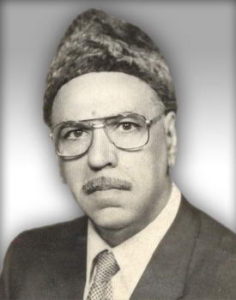
Eshagh Kohan-sedgh was born in 1928 in Tehran into a devoted Jewish family in Tehran. His father, Shlomo Kohan-sedgh, commonly known as Sultan Sulayman, was a prominent cultural figure of the Jewish community and the founder of the Iran Jewish Organization.
Eshagh Kohan-sedgh completed his elementary and secondary studies in Alliance School in Persian literature. After completing national military service in 1949, he joined his father in his philanthropic and cultural activities. He gained experience and learned the religious principles and jurisprudence of the Jewish religion and other monotheistic creeds.
While working with his father since 1952, Eshagh contributed significantly to the Jewish community. He honored his father’s will and continued to sincerely and full-heartedly serve the Jewish soceity. He committed to preserve Sultan Sulayman’s name and knowledge, clinging on to the charecteristics and mentality he had acquired while working with him.
Eshagh Kohan-sedgh also spent some time working in the market. He had rented a store and sold mapping and engineering tools. However, he returned to devoting himself fully to community service when his business failed to succeed after four years.
He married Rahel from the Khalpari family in 1966. They had a son and a daughter. His son, Dr. Sulayman Kohan-sedgh, also followed his father and grandfather’s path, actively dedicating himself to public activity, and became a member of the Tehran Jewish Committee in 2011. He became responsible for printing the quadripartite calendar after the demise of his father.
Eshagh Kohan-sedgh extracted, organized, and published the quadripartite calander from 1962 using a new style. His calander was published for more than half a century on Rosh Hashanah (Jewish New Year), entitled Kohan-sedgh Calendar, and remained one of the most comprehensive and accurate calendars available to the public.
The quaripartite calendar is considered as one of the richest cultural contributions of the Jewish community, consisting of the scientific, cultural, and religious events of all monotheistic religions. The calander has certainly played a significant role during the past century in preserving and propogating the history and culture of Iranian Jews. The value of this calendar became even more evident after the Islamic revolution of 1979 in Iran and the immigration of some Jews. Therefore, it was praised by the Iranian Jewish community and other non-Jewish communities. In 2011, the Ministry of Culture and Islamic Guidance of Iran awarded Eshagh Kohan-sedgh with a certificate in recognition of the effort that he put into publishing the quadripartite calander.
Eshagh Kohan-Sedgh began his public activities by becoming an official member of the Tehran Jewish Society in 1986. He began as the society’s inquisitor for three years. Afterwards, he became an elected member of the administrative committee for twenty two years, up until 2011, chaired by Haroun Yashayaei. He was an active member of the comittee and was also elected as the Keeper of the Seal of the community for several terms.
The Central Library of the Tehran Jewish Committee was opened in 1992. As a member of the cultural comittee of the Community, Eshagh Kohan-sedgh was appointed as the director of the library. He was soon asked to collect an album of ancient and hisotric Iranian Jewish relics. As the cultural cunsultant, he was also responsible for collecting and publishing “Excerpts of the Holy Book” by Yusef Mohabbati.
It was also Eshagh Kohan-sedgh’s perseverance that led to the first government permission for a Kosher restaurant—a demand of the Jewish community from long ago. The restaurant was called “Kolah Farhangi”.
Eshagh Kohan-sedgh was interested in music as well. He played the Ney and flute adeptly. Another one of his hobbies was studying the oral history of Iranian Jews. He remained an active and vibrant individual, with a vehement desire to pursue and solve the troubles that his fellow coreligionists faced. He was an avid reader of books related to culture, history, and religion of Jews and other religions. Eshagh Kohan-sedgh was connected to a network of scholars of other monotheistic religions as well.
Having served the community in its social and cultural needs for more than six decades, Eshagh Kohan-sedgh passed away on November 2012, equal to 11 Kislev 5773, aged 84.
